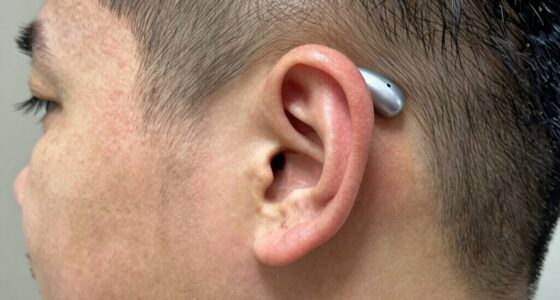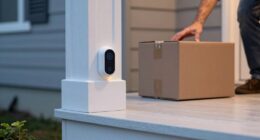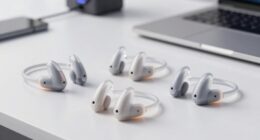If you experience sudden sensorineural hearing loss, act immediately by seeking urgent medical care within 48 hours. Your next steps include getting a quick assessment, starting corticosteroids to reduce inner ear inflammation, and managing symptoms like tinnitus. Stay calm and follow your healthcare provider’s instructions carefully. Ensuring prompt treatment can improve your chances of recovery. Keep going to discover more essential tips to effectively manage this emergency and support your hearing health.
Key Takeaways
- Seek urgent medical attention within 48 hours and confirm the diagnosis promptly.
- Initiate corticosteroid treatment immediately to reduce inner ear inflammation.
- Educate the patient on the importance of early intervention and adhere to prescribed therapies.
- Manage symptoms like tinnitus with sound therapy or counseling during initial treatment.
- Minimize exposure to loud environments and incorporate environmental supports like HEPA filtration.
Immediate Actions and Care for Sudden Hearing Loss

Sudden sensorineural hearing loss (SSNHL) is a medical emergency that requires prompt action to improve your chances of recovery. If you experience this sudden loss of hearing, time is of the essence. Early intervention can substantially influence the outcome, so acting quickly is essential. Once you’ve recognized the symptoms, seeking immediate medical attention should be your top priority. The first steps involve rapid assessment and initiating appropriate treatment, which often includes corticosteroids to reduce inner ear inflammation. During this critical 48-hour window, your healthcare provider will also focus on managing symptoms like tinnitus. Tinnitus management plays a key role in helping you cope with the ringing or buzzing sounds that often accompany SSNHL. Your provider may suggest sound therapy, counseling, or medications to lessen the distress caused by tinnitus, making it more manageable during the recovery process.
Patient counseling is another fundamental component during these initial hours. Your healthcare team will explain the nature of your condition, outline treatment options, and set realistic expectations for recovery. They’ll also emphasize the importance of adhering to prescribed medications and follow-up appointments. This counseling helps you understand that while some degree of hearing restoration is possible, outcomes can vary based on the severity of the loss and how quickly treatment begins. It’s normal to feel anxious or overwhelmed, but knowing what to expect can ease your worries and improve your cooperation with medical advice. Incorporating HEPA filtration into your environment may also help support overall ear health by reducing airborne irritants during recovery.
In addition to medication, your provider might suggest lifestyle adjustments to support your recovery. These include avoiding loud environments, managing stress, and maintaining a healthy diet to promote overall ear health. If tinnitus persists after treatment, your provider will help you explore additional management strategies, such as cognitive behavioral therapy or tinnitus retraining therapy, to improve your quality of life. During this pivotal first day, it’s important to stay calm and focused, following all medical instructions carefully.
Frequently Asked Questions
What Are the Long-Term Prognosis Odds for Sudden Sensorineural Hearing Loss?
The prognosis for sudden sensorineural hearing loss varies based on factors like age, severity, and how quickly you start treatment. Early intervention improves your chances of hearing recovery, but some may experience partial or no recovery. While the outlook can be uncertain, prompt treatment generally offers the best opportunity for a positive outcome. Keep in mind, prognosis factors heavily influence long-term hearing recovery, so acting fast is essential.
Can Lifestyle Changes Prevent Future Episodes of Sudden Hearing Loss?
Think of your ears as delicate gardens needing careful tending. Lifestyle modifications serve as your preventive strategies, helping shield your hearing from future storms. By avoiding loud environments, managing stress, and maintaining a healthy diet, you create a protective barrier against sudden loss. While they can’t guarantee prevention, these habits strengthen your ears’ resilience, turning a fragile bloom into a sturdy bloom, ready for whatever soundscapes life throws your way.
Are There Specific Medications That Worsen Sudden Hearing Loss?
You should be aware that certain medications can worsen sudden hearing loss due to drug side effects or interactions. Some drugs, like high doses of aspirin, antibiotics, or chemotherapy agents, may negatively impact your hearing. Always inform your healthcare provider about all medications you’re taking, and avoid self-medicating, especially without professional guidance, to prevent medication interactions that could exacerbate your condition.
How Effective Are Alternative Therapies Like Acupuncture in Treatment?
You might wonder about complementary approaches like acupuncture for sudden sensorineural hearing loss. While some believe acupuncture can support recovery, current evidence on its efficacy remains limited and inconclusive. It’s important to discuss these options with your healthcare provider before trying them, as they shouldn’t replace proven treatments. Acupuncture may serve as a complementary therapy, but relying solely on it isn’t recommended without solid scientific backing.
What Are the Signs Indicating Need for Urgent Medical Consultation?
If you experience ear ringing or dizziness, you should seek urgent medical attention. These signs can indicate a serious underlying issue like sudden sensorineural hearing loss or other ear problems. Don’t delay—prompt evaluation is vital to prevent permanent damage. Head to the emergency room or contact a healthcare professional immediately if these symptoms happen suddenly or worsen, ensuring you get the treatment you need as soon as possible.
Conclusion
When faced with sudden sensorineural hearing loss, acting swiftly is your best weapon—think of it as catching lightning in a bottle. Follow the checklist, seek emergency care, and don’t delay. Remember, time is your ally in turning back the silence. By acting promptly, you can seize the chance to restore hearing and rewrite your story before the window closes. Don’t wait—your hearing’s future depends on your quick action today.










